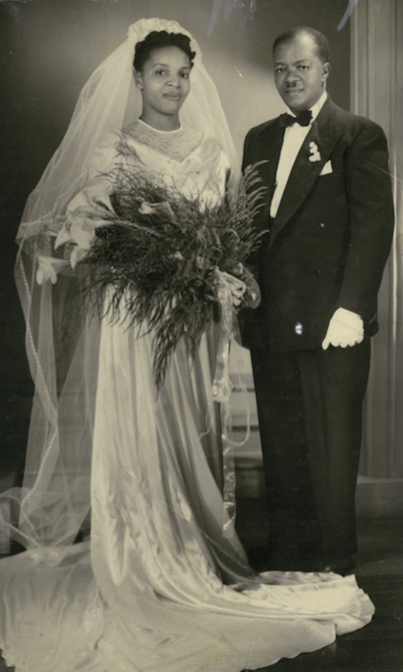Julia Mavimbela
Julia Nompi Mavimbela was a schoolteacher, community leader, and leader in her local congregation of The Church of Jesus Christ of Latter-day Saints.
She was born on December 20, 1917, in South Africa. She was chief monitor in college and oversaw the care of 300 girls. She first obtained her teaching certificate and the studied for two more years, specializing in kindergarten teaching. She became the first woman principal at a school in Boxburg.
She married John Mavimbela and she helped him run a grocery store and butcher shop in Eastern Native Township. He was tragically killed on June 9, 1955, while driving home from work. The police blamed John for the accident, even though the head-on collision occurred on his side of the road, because they said that Blacks were careless drivers. The driver who hit him was White. His death occurred during the racial strife of Apartheid (1948–1994).
To support herself and her four children (she was pregnant with her fifth), she also worked as a social worker and a school teacher at a Catholic School in South Africa.
- Shortly after the death of her husband, in a night of “troubled sleep,” Julia had a dream in which John appeared to her, handed her some overalls, and said, “Go to work.” Describing the result of this dream, she said, “I found a way of getting myself away from the worries of these years, and that was through community involvement.”[1]
“She eventually learned not to give in to bitterness; rather, she spent her life striving to be healed and to heal her beloved country through Christlike service. It was her love of the land, her faith in God, and her dedication to living by her faith’s principles that made this possible.”[2]
After the 1976 Soweto uprising, public schools were closed for two years. Mavimbela gathered local school children and taught them how to read while creating community gardens with them. When gardening with the students, Mavimbela told them, "Let us dig the soil of bitterness, throw in a seed, show love, and see what fruits will grow. Love will not come without forgiving others. Where there was a bloodstain, a beautiful flower must grow.”[3]
Mavimbela co-founded Women for Peace, a group for all races that aimed to have a peaceful transition to true democracy in South Africa. From 1984–1986, Mavimbela was co-president. “Women for Peace supported initiatives important to women. The group asked storekeepers to indicate that powdered milk products should not be fed to infants and asked that school teachers be paid more money. Women for Peace also petitioned for making common-law marriages easier to obtain and for the Matrimonial Property Act, which allows a widow to have her deceased husband's property instead of the eldest son. They also petitioned for integrated playgrounds and prison reform.
Mavimbela was a vice president of the group National Women of South Africa, and president of the Transvaal Region of the National Council of African Women.”[4]
After being baptized a member of The Church of Jesus Christ of Latter-day Saints, she served as a Relief Society branch and stake president, public affairs director, and temple ordinance worker in the Johannesburg South Africa Temple. In 1989 she was asked to speak at BYU Women’s Conference and, in 1995, was honored at Brigham Young University for “outstanding contribution to a profession, a community, a religion.”[5]
n 1991 Mavimbela served as an LDS public affairs missionary for the Africa area with Mary Mostert as her companion. In this position they contacted many leading politicians with information on the US constitution during the time South Africa was formulating the structure of its post-Apartheid government.
- Mavimbela spoke at her stake conference following her baptism, and for many in the audience, it was their first time ever being addressed by a black person. After apartheid ended, black and white members were allowed to attend Church together. Elder Dale G. Renlund shared the following story in his April 2015 general conference address:
- “For many, the equality of interaction between the races was new and challenging. One time, as Julia and Thoba [Julia's daughter] attended church, they felt they were treated less than kindly by some white members. As they left, Thoba complained bitterly to her mother. Julia listened calmly until Thoba had vented her frustration. Then Julia said, 'Oh, Thoba, the Church is like a big hospital, and we are all sick in our own way. We come to church to be helped.’”[6]
Mavimbela died on July 16, 2000.
